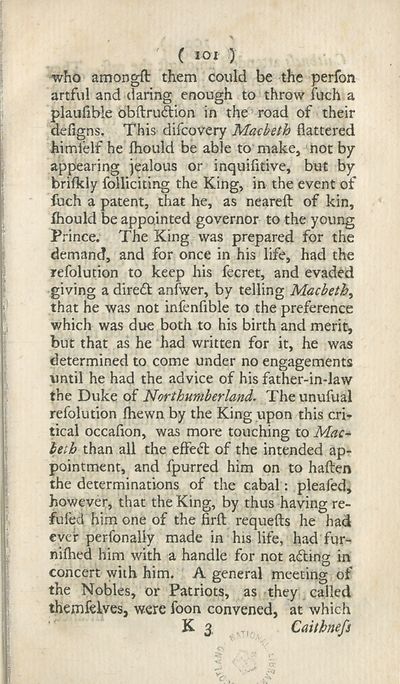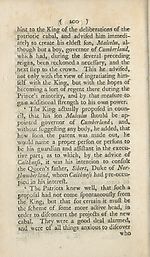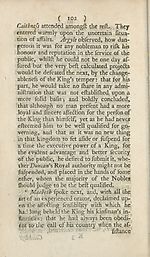Download files
Complete book:
Individual page:
Thumbnail gallery: Grid view | List view

( 101 )
who amongft them could be the perfon
artful and daring enough to throw fuch a
plaufible obftru&ion in the road of their
defigns. This difcovery Macbeth flattered
himlelf he fhould be able to make, hot by-
appearing jealous or inquifltive, but by
brifldy folliciting the King, in the event of
fuch a patent, that he, as neareft of kin,
fhould be appointed governor to the young
Prince. The King was prepared for the
demand, and for once in his life, had the
refolution to keep his fecret, and evaded
giving a dire£t anfwer, by telling Macbeth^
that he was not infenfible to the preference
which was due both to his birth and merit,
but that as he had written for it, he was
determined to come under no engagements
until he had the advice of his father-in-law
the Duke of Northumberland. Theunufual
refolution fhewn by the King vipon this cri¬
tical occafion, was more touching to Mac¬
beth than all the eflfeft of the intended ap¬
pointment, and fpurred him on to haften
the determinations of the cabal: pleafed,
however, that the King, by thus having re-
fufed him one of the firfl: requefts he had
ever perfonaliy made in his life, had fur-
nifhed him with a handle for not acting in
concert with him. A general meeting of
the Nobles, or Patriots, as they called
themfelves, were foon convened, at which
K 3 Caithnefs
who amongft them could be the perfon
artful and daring enough to throw fuch a
plaufible obftru&ion in the road of their
defigns. This difcovery Macbeth flattered
himlelf he fhould be able to make, hot by-
appearing jealous or inquifltive, but by
brifldy folliciting the King, in the event of
fuch a patent, that he, as neareft of kin,
fhould be appointed governor to the young
Prince. The King was prepared for the
demand, and for once in his life, had the
refolution to keep his fecret, and evaded
giving a dire£t anfwer, by telling Macbeth^
that he was not infenfible to the preference
which was due both to his birth and merit,
but that as he had written for it, he was
determined to come under no engagements
until he had the advice of his father-in-law
the Duke of Northumberland. Theunufual
refolution fhewn by the King vipon this cri¬
tical occafion, was more touching to Mac¬
beth than all the eflfeft of the intended ap¬
pointment, and fpurred him on to haften
the determinations of the cabal: pleafed,
however, that the King, by thus having re-
fufed him one of the firfl: requefts he had
ever perfonaliy made in his life, had fur-
nifhed him with a handle for not acting in
concert with him. A general meeting of
the Nobles, or Patriots, as they called
themfelves, were foon convened, at which
K 3 Caithnefs
Set display mode to:
![]() Universal Viewer |
Universal Viewer | ![]() Mirador |
Large image | Transcription
Mirador |
Large image | Transcription
| Antiquarian books of Scotland > Languages & literature > Key to the drama > (123) |
|---|
| Permanent URL | https://digital.nls.uk/122387192 |
|---|
| Description | Thousands of printed books from the Antiquarian Books of Scotland collection which dates from 1641 to the 1980s. The collection consists of 14,800 books which were published in Scotland or have a Scottish connection, e.g. through the author, printer or owner. Subjects covered include sport, education, diseases, adventure, occupations, Jacobites, politics and religion. Among the 29 languages represented are English, Gaelic, Italian, French, Russian and Swedish. |
|---|

